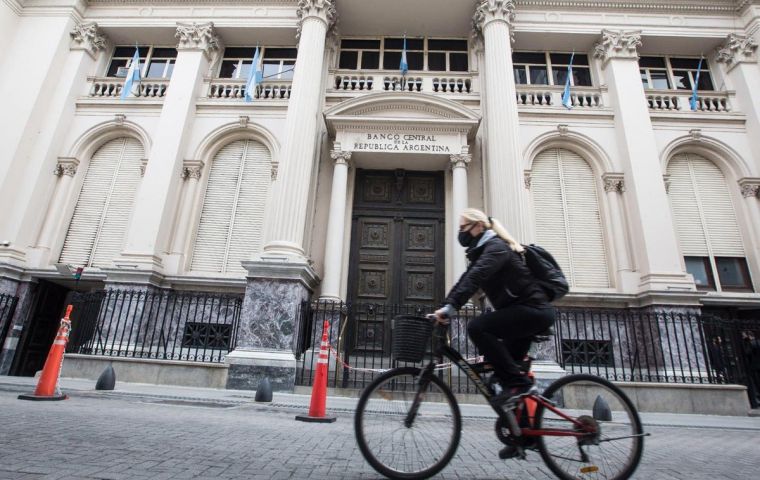MercoPress. South Atlantic News Agency
Argentina's banks face a tough year: bad loans, inflation and regulations
 The central bank requires banks to pay minimum rates of 37% on retail deposits, while allowing them to charge just 24% on loans to small and midsize companies
The central bank requires banks to pay minimum rates of 37% on retail deposits, while allowing them to charge just 24% on loans to small and midsize companies Rising inflation plus bad loans and government regulations anticipate a tough 2021 according to the CEO of Argentina's biggest private bank by market capitalization. “If inflation is high, there is a risk that bank results will fall to very low or negative levels in real terms,” Fabian Kon said in an interview in Buenos Aires.
In effect Argentina's inflation which was 36% in 2020, despite many prices and rates frozen, could end up over 40% this year adding to the problems of an economy devastated by three years of recession, and before that eight years of stagflation. This has had an impact on bad debt, lesser demand for new loans and a raft of banking regulations.
Banco Galicia’s loan portfolio is concentrated in the consumer sector, with an emphasis on credit cards and personal loans. Kon’s challenge will be to sustain profitability even as government regulations undermine those businesses.
The central bank requires banks to pay minimum interest rates of 37% on retail deposits, while allowing them to charge just 24% on loans to small and midsize companies. Inflation, currency controls and restrictions on dividend distributions add to the headache for bank executives.
Private banks on average posted a return on assets of 2.2% in November, the lowest level in eight months and one of the two worst months in the past 10 years, according to the latest report from the central bank. Return on equity dropped to 14.6%, the lowest since 2007.
Kon, who has been general manager since 2016, said his strategy is threefold: boost the number of clients by 5% in 2021, deepen its relationships with customers and aggressively expand digitization. He is also open to acquiring smaller banks in the local market, where results have also taken a beating.
Grupo Financiero Galicia, the bank’s parent company, is the most liquid stock in Argentina, and is typically a top beneficiary of inflows when investor optimism improves. Shares of the company tumbled 46% in 2020, while competitors Banco Macro SA and Banco BBVA Argentina SA fell 57% and 42%, respectively.
CEO Kon said the central bank should remove measures that allow individuals to postpone payments on their loans, which make it hard for banks to assess whether the loans will be paid or not; discourage the use of the cash economy, which is often associated with tax evasion; and allow banks to compete on loan interest rates. Current central bank regulations mean banks must charge very similar rates.




Top Comments
Disclaimer & comment rules-

-

-

Read all commentsThree simple questions:
Mar 05th, 2021 - 05:16 pm +11. Would you deposit any free capital in an Argentine bank?
2. Do you think that any wealthy Argentines do NOT have off shore accounts?
3. Does anyone actually believe that the Argentine government has any credibility?
Anyone that disagrees with my questions — I urge them to place their life savings in high yield Argentinian bonds payable supposedly in 10 or 20 years...
pack all Jeffersons you can pack
Mar 05th, 2021 - 01:24 am 0Let's get real here. Don't they say this every year?
Mar 05th, 2021 - 02:59 am 0Commenting for this story is now closed.
If you have a Facebook account, become a fan and comment on our Facebook Page!